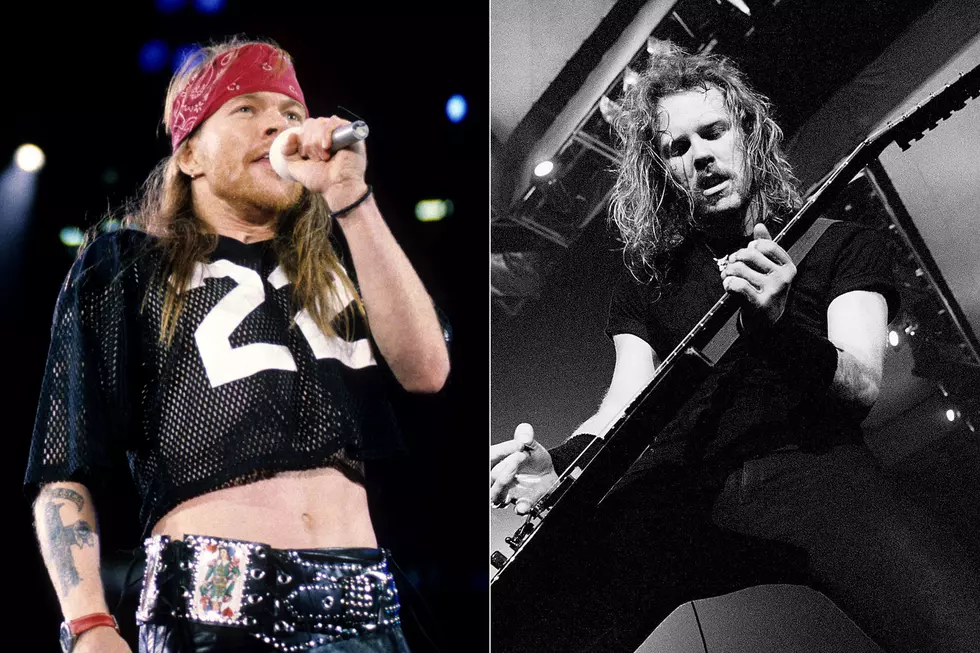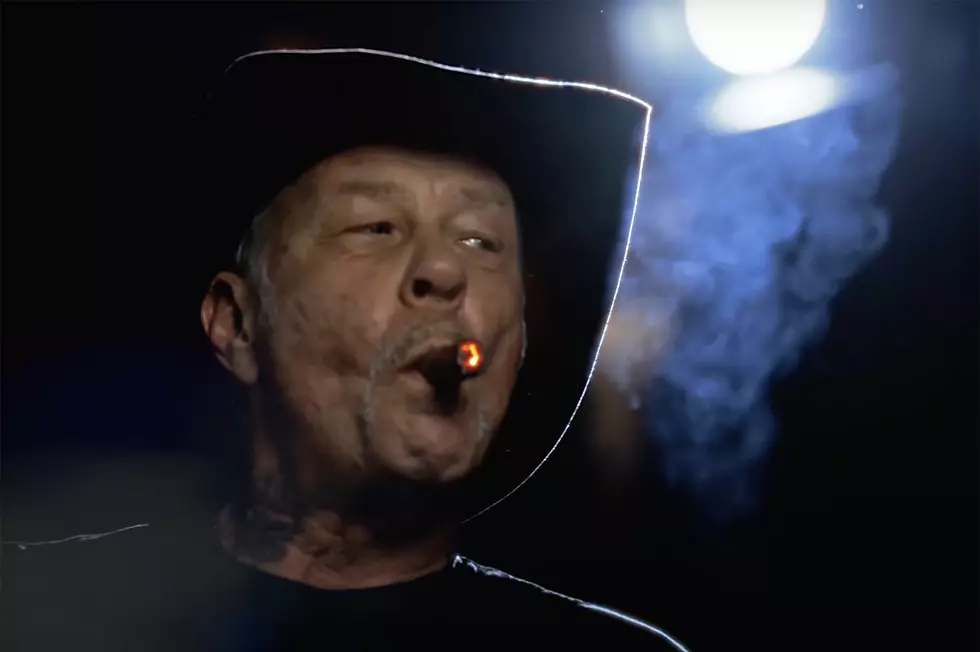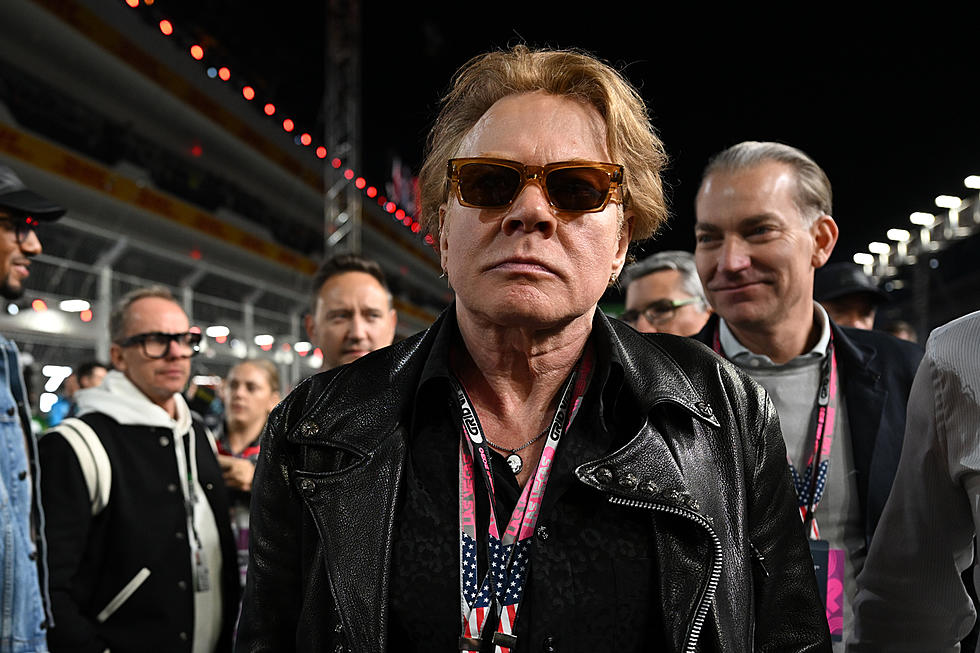
How GNR and Metallica’s Joint Tour Foreshadowed Their Futures
On the surface, Guns N' Roses and Metallica's mammoth 1992 co-headlining tour made perfect sense. Booking the two biggest rock bands in the world for a joint stadium trek behind their recent chart-topping, multi-platinum albums sounded like a license to print money.
But when the double-header commenced on July 17, 1992, it was instantly fraught with dysfunction and tension between both bands — and it foreshadowed in no uncertain terms their radically different trajectories.
Metallica and Guns N' Roses were riding high on the success of the self-titled Black Album and the twin Use Your Illusion LPs, respectively, by the time they sat down to hash out the tour details. Both bands had met in 1987 and bonded in early 1988 while Metallica was recording ... And Justice for All in Los Angeles and GNR's Appetite for Destruction was in the midst of its slow burn up the charts. They also shared the stage at the Hollywood Palladium in November 1990 during RIP magazine's fourth-annual anniversary party, bashing through a messy mini-set as the short-lived and crudely named supergroup the Gak (with help from Skid Row frontman Sebastian Bach).
"I've always wanted to play with these guys, ever since we met them in 1987," Metallica drummer Lars Ulrich said at a press conference announcing the tour. "I'm the one who had all the late night conversations with the various members of Guns. Back in '87, we were the bigger band, then they became the biggest band in the universe. Now, in the hard rock scene of 1992, we're the two biggest bands. Taking the two biggest bands from one genre of music and putting them together is unprecedented."
Watch Guns N' Roses and Metallica on MTV's 'Live & Loud' 1992
One of Guns N' Roses' stipulations for the tour was that they would play last, which suited Metallica just fine. The no-nonsense thrashers took the stage promptly every night and melted faces with militaristic precision — the same strategy that had elevated them from the underground to the top of the world over the previous decade.
Once Metallica exited, it was anyone's guess when the legendarily tardy Guns N' Roses, constantly at the mercy of mercurial frontman Axl Rose, might take the stage. A write-up from the tour kickoff at Washington, D.C.'s RFK Stadium said the Gunners kept nearly 50,000 fans waiting for roughly two hours, during which time the attendees grew increasingly drunk and disorderly, pelting each other with food and drinks and sexually harassing female concertgoers.
When the opening bass riff to "It's So Easy" finally signaled the start of Guns' set, they hit the stage with the same fire and fury that categorized their early days as a bloodthirsty club act. But the set's second half reportedly sagged under the weight of gratuitous instrumental solos and sleepy song choices, delivered by a bloated, 13-piece band that included four backup singers, a three-piece horn section and an auxiliary keyboardist and percussionist.
Bruce Britt of the Los Angeles Daily News was damning in his assessment. "The band never regained its footing, and the crowd slowly thinned," he wrote. "Some of the remaining fans were spied sleeping or just sitting, bored expressions on their faces.
"If Guns N' Roses isn't careful this tour could sound the band's death knell," he continued. "As comparatively sluggish sales of the band's two current albums suggest, fans may be growing weary of Rose's brattiness."
Watch Guns N' Roses Live in 1992
Delays and on- and offstage tantrums from Rose at future tour dates would make the two-hour changeover time at RFK Stadium seem downright expeditious by comparison. The most infamous example took place in Montreal on Aug. 8, 1992, when Metallica's James Hetfield was severely burned onstage during a pyrotechnic mishap that forced the band to cut its set short.
Rather than saving the day and satiating fans with a heroic performance, Guns N' Roses reportedly took the stage more than two hours after Metallica left and delivered a truncated set, with Rose complaining of monitor issues and storming offstage after nine songs. Fans consequently rioted, racking up a half-million dollars in damages and leading to at least a dozen arrests — a chilling reminder of the St. Louis riot from the previous year.
"After we left, it was up to Guns to play a blinding three-hour set, but that didn't happen," Ulrich told Spin in 1999. "And quite a few kids who were upset about it found ways to show their displeasure toward the fine facilities of Olympic Stadium. Axl's so pure or set in his own ways that if he can't go out and deliver 110 percent, he'd rather not deliver. That was the wrong night to have monitor problems."
The situation offstage was hardly better, with Rose blowing six figures a night on gargantuan, themed parties. "We'd spend $100,000 on parties," Guns drummer Matt Sorum told Spin. "For two and a half years, there was something every night. One night was Greek night — four greased-up, muscle-bound guys carried in roast pig. ... The first night we played Giants Stadium, there was one pinball machine and a few bottle of booze backstage. Axl came in and said, 'This isn't the Rolling Stones!' So the next night there's a full casino, tons of lobster and champagne following everywhere."
This lavish spending did little to impress Metallica (Hetfield was later captured on video mocking Rose's preposterous tour rider), and it only embarrassed the rest of Guns N' Roses. "Our inability to get onstage on time was like the big elephant in the room every night," Slash lamented in his 2007 memoir. "Lars Ulrich never said anything to me, but he did to Matt and it was humiliating and embarrassing how lame those parties were and how disappointed Metallica were that we couldn't even get onstage on time."
James Hetfield Mocks Axl Rose's Tour Rider
Despite numerous sellouts and tens of millions of dollars grossed, the tour was hardly the goldmine for Guns N' Roses that it should have been. "Metallica was earning the exact same paycheck as we were every night," Slash wrote, "but while they pocketed the whole thing, we were blowing 80 percent both on union dues for all of the overtime we cost ourselves going on late and on these stupid theme parties. It was just bad."
Beneath the excess, debauchery and headline-grabbing antics, there also remained the unshakable feeling that Guns N' Roses — whose ranks now included several replacement members and hired hands — were no longer the close-knit, streetwise crew that had clawed their way to stardom a few years earlier. "We played with Guns N' Roses at the Rose Bowl then, and they were already fragmenting," Motorhead's Lemmy Kilmister told Spin. "Axl was on his own — it didn't feel like they were thinking as a band anymore."
Indeed, Guns N' Roses' days were numbered. Following the end of the two-and-a-half-year Use Your Illusion Tour — which saw plenty more walk-offs and tantrums from Rose — in July 1993 and the release of the punk-rock covers album "The Spaghetti Incident?" that November, the band fell into a period of inactivity, during which all original and semi-original members left. Rose spent the next decade and a half toiling in seclusion on Chinese Democracy, which reportedly cost more than $13 million to make, finally releasing it to a lukewarm commercial reception in 2008.
Metallica, on the other hand, criss-crossed the globe in support of the Black Album for the next several years, packing arenas and stadiums and headlining massive festivals such as Woodstock '94. They scored another pair of chart-topping, multi-platinum smashes with 1996's Load and 1997's Reload, and they continued touring religiously throughout the rest of the decade, adhering to the same ironclad work ethic that made them famous in the first place.
Watch Metallica Live in 1992
Perhaps Metallica was inspired by the dysfunction they witnessed on their ill-fated outing with Guns N' Roses. "They showed me what I don't ever want to become, or what I would not do," former Metallica bassist Jason Newsted told Loudwire in 2017. "Antics, pissing away of money, disrespecting of people that work for you. Looking down on people who look up to you — worst thing you can do, especially in this business. I saw them do that a lot, and I didn’t like it."
The 30 Wildest Moments From Guns N' Roses' Use Your Illusion Tour
More From Ultimate Classic Rock









